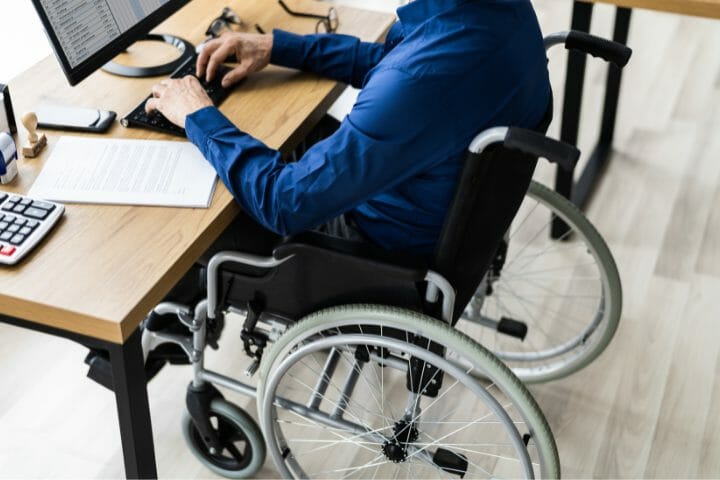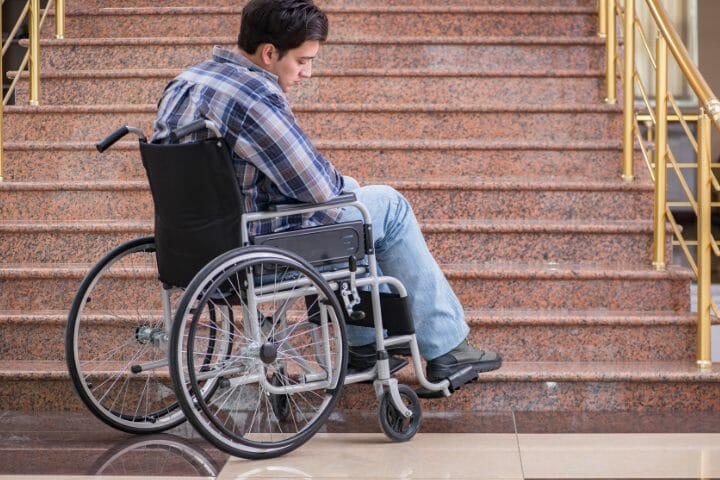Disability can happen to anyone, whether they are a billionaire or a common thief. But is the law same for everyone? Can you get disability with a felony? Or are the doors of social justice closed forever with one mistake? Let’s find out.
Contents
Can you get disability with a felony? Many people may not know the answer to this question, and the answer may be surprising for those who do know. The short and simple answer is YES, you can get disability even if you were a criminal and were in jail.
In this article, we will explore how someone can receive disability benefits with a felony on their record. We will also look at some specific requirements that must be met to be approved for such benefits. So, if you’re curious about this topic, keep reading!

Do I Qualify for Disability Benefits If I Have Prior Criminal Convictions?
If you have been convicted of a crime and are no longer in prison but are now on probation or parole, you may still be eligible for Social Security Disability benefits. Your criminal conviction must have occurred at least five years ago to qualify for benefits.
Additionally, the judge who presided over your case must have found that you have a mental impairment that affects your ability to work or participate in social activities.
The Social Security Administration (SSA) will review several factors when determining whether or not you are eligible for disability benefits if you have a prior criminal record.
One thing that is important to understand about receiving Social Security Disability benefits as someone with a criminal record is that there is no guarantee that the SSA will approve your application.
You must prove that your mental disability is severe enough to make working or learning a challenge to be considered eligible. This can be done by providing extensive documentation of your condition and any treatment or therapy you have undergone in the past five years.
You might also like to read: Can You Get Disability For Panic Disorder
Eligibility for Felons
The first thing that needs to be done is to determine whether your conviction stands as a barrier to eligibility for disability benefits. As a felon, you must have completed your prison sentence (or been paroled from prison) at least five years ago to be eligible for disability assistance.
If you are still incarcerated or serving out your parole, you will not be able to apply for disability because it is considered impossible for inmates and parolees to work at any job, given the nature of their incarceration.

What if I was caught evading arrest or in person?
If you are currently incarcerated, you are not eligible for benefits. Become disabled while in prison, and it is determined that your disability is not a result of your incarceration.
You may be eligible for benefits upon your release. If you have been released from prison but remain on parole, you are still not eligible for benefits.
If you have been evading arrest, whether or not you qualify for benefits will depend on the severity of your crime and how long you’ve been on the run.
Generally speaking, if you have been convicted of a felony and are considered a fugitive from justice, you will not be eligible for benefits.
However, if your crime was relatively minor and it has been several years since your conviction, you may be able to get benefits. In addition, if the disability occurs while you are on the run and is unrelated to your crime, you may become eligible for benefits once you have been apprehended.

What if I got my disability just before or around the same time as my crime?
If you have a disability that occurred around the same time when you committed a crime, you may still be eligible for Social Security disability benefits.
The Social Security Administration (SSA) will consider your age, education, and work experience when determining whether you can adjust to other work. They will also look at the severity of your medical condition and how it affects your ability to function in everyday life.
What if I got my disability while I was serving the prison sentence?
If you become disabled while serving a prison sentence, you may qualify for Social Security disability benefits. To receive benefits, you must have worked long enough to earn the required number of work credits, and your disability must meet the Social Security Administration’s (SSA) definition of “disability.”
In general, persons who are disabled and confined to prisons are not eligible for Social Security disability benefits. However, if you become disabled while serving a prison sentence, you may qualify for benefits if you meet the above conditions.

What if I violated my parole or probation?
If you have been convicted of a crime and are currently on parole or probation, you may still be eligible for disability benefits. However, your benefits will be suspended if you violate your probation or parole term.
You might also like to read: Can You Get Disability For Borderline Personality Disorder?
Will I Get My VA Benefits if I Go To Prison?
If you are incarcerated in a local, state or federal prison, you may still be eligible for VA benefits. However, your eligibility may be affected by the length and type of your sentence.
For example, if you are sentenced to more than 60 days in prison, you will not be able to receive any VA benefits during that time. This includes disability compensation, pension payments, education benefits, and health care services.
If you are sentenced to less than 60 days in prison, you may still be eligible for some VA benefits. However, your eligibility for health care services will be limited to emergency services only. You will also not be able to receive disability compensation or pension payments during your incarceration.
If you are sentenced to life in prison, you will not be eligible for VA benefits.

Other Crime Related Activities That Could Impact Eligibility
Other criminal activities that could impact an individual’s eligibility for disability benefits include:
- Having an outstanding warrant for their arrest
- Being a fugitive from justice
These activities could impact the individual’s eligibility for benefits, depending on the type of disability and severity of their impairment.

Frequently Asked Questions
1. What disqualifies a person from disability?
Several things can disqualify a person from getting disability benefits, including the following:
If you are working at above the prescribed limit i.e. SGA (substantial gainful activity) you will not qualify for disability benefits as it will be considered that you are earning too much money to be considered disabled.
If your disability is a short term disability which will go away within 12 months, you will not qualify for benefits.
If Disability Determination Services and SSA are not able to search you or communicate with you regarding the application, etc.
If you refuse to cooperate with SSA officials.
If your disability is due to addiction to alcohol or drugs.
If you don’t follow your doctor’s prescribed treatment.
If you commit fraud or obtain the benefits through dishonest means.
If you are a felon, but there are some exceptions to it as discussed above.
2. What is the hardest state to get a disability?
Oklahoma is one of the most challenging states in America to receive Social Security disability benefits. The approval rate for applicants approved by Oklahoma’s system, 33%, was at its worst this year with an even higher number – 34%.
3. What should you not say in a disability interview?
It’s important to remember that you should never talk about alcohol or drug use, criminal history, and similar topics when questioned by an employer. However, if these things come up in conversation, answer truthfully – don’t lie because it could backfire on you!
4. How do you get declared disabled?
You get declared disabled if you receive one of the following:
A permanent disability benefits award from the Social Security Administration
A determination from your state’s Vocational Rehabilitation agency that you are unable to work because of your disability
A statement from your physician or another medical professional that you have a disability that will last for at least 12 months or result in death.
5. What is post-incarceration syndrome?
Post-incarceration syndrome (PICS) is a set of problems that can occur after someone has been released from prison.
These problems can include mental health issues, difficulty finding housing and employment, and issues re-adjusting to society. PICS can make it difficult for someone to lead a successful and productive life after leaving prison.
6. Do federal prisoners get money when released?
When federal prisoners are released from prison, they do not receive any money. Instead, they typically get a set amount of time to find a job and support themselves financially.
If they cannot do so, they may be eligible for government assistance programs. Some states also have programs that provide financial assistance to ex-offenders, but these vary significantly in terms of eligibility and benefits.
You might also like to read: Can You Get Disability With Tourette’s Syndrome?
A Few Final Words
Government benefits are not biased, but it is for everyone who meets the required criteria. Whether you are a doctor, an engineer, or a felon, if you don’t meet these criteria, you will be deprived of these benefits.
Hence learn about all the benefits available before it is too late and you are not a recipient anymore. Thank you for reading the article, we hope we were able to answer your questions to the fullest extent. If you have further doubts, you can reach out to us in the comments box.
